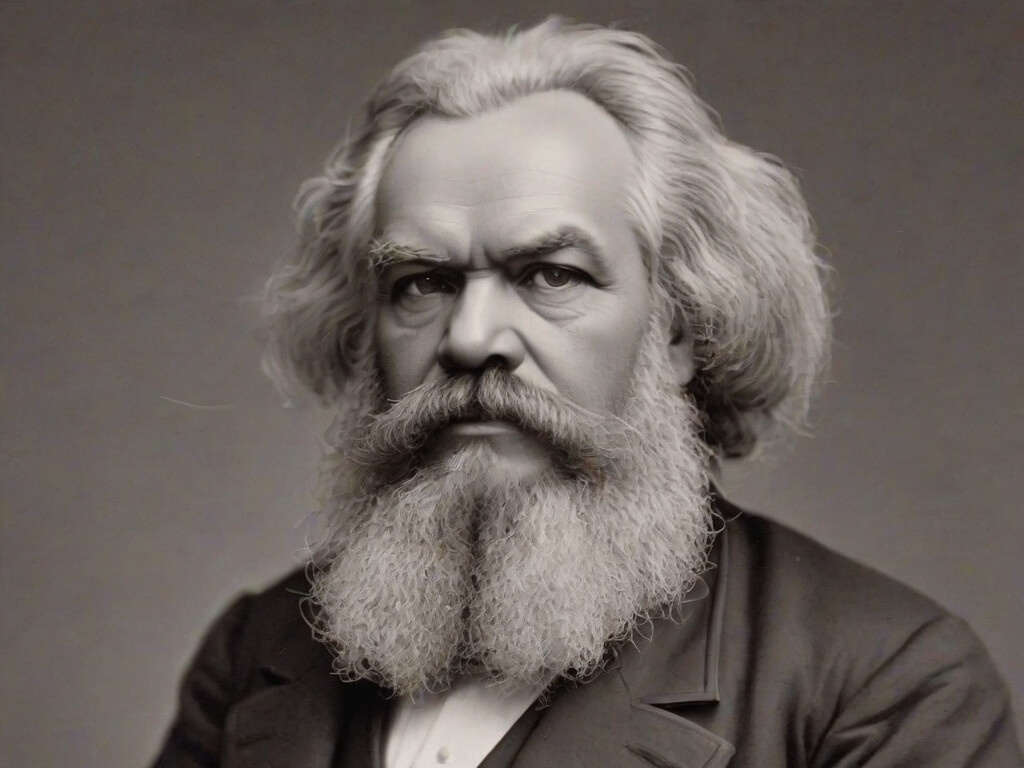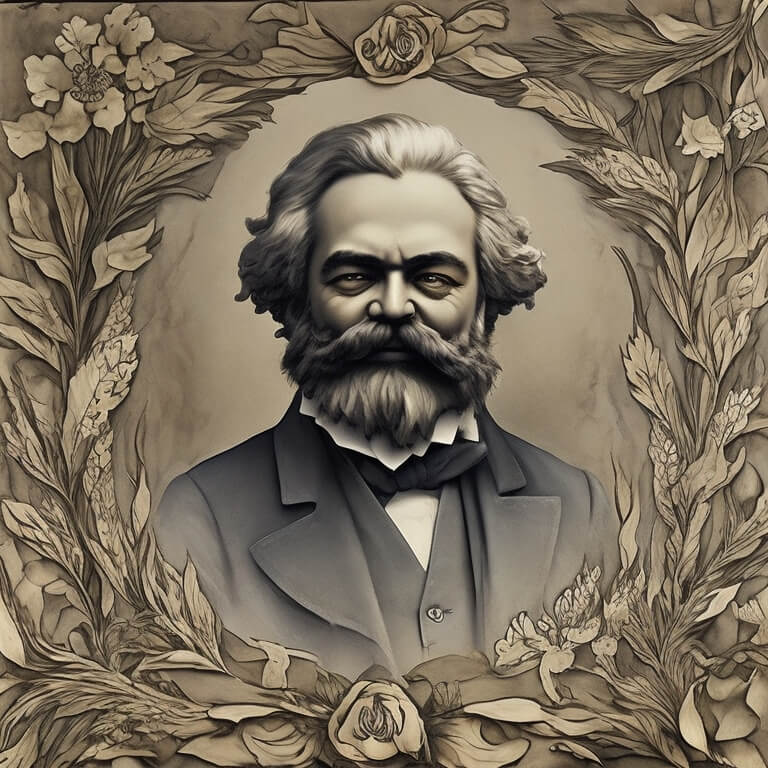Explore the life, ideas, and influential works of Karl Marx (1818-1883), the German political philosopher who laid the foundations of scientific socialism. From his early career in journalism to the creation of Marxism and seminal works like “Das Kapital,” delve into the intellectual journey and lasting impact of this key figure in the development of modern international communism.

Karl Marx; ( 1818-1883), German political philosopher and founder of scientific socialism, whose doctrine, known as Marxism, forms the basis of modern international communism.
Background and Education:
Marx was born in the town of Trier in the Prussian Rhineland on May 5, 1818. His family was Jewish, but his father, a lawyer and public official, converted to Christianity in 1824, and all family members were baptized in the Lutheran Church. Intending to pursue an academic career, Marx studied history, philosophy, and law at the universities of Bonn and Berlin, and in 1841 he received his doctorate from the University of Jena.
While in Berlin, Marx became absorbed in the study of social and political problems and joined the left-wing Young Hegelian movement. The. influence of Hegel’s dialectic as a method of analyzing society was to continue throughout Marx’s life, although he rejected Hegelian political philosophy. See Hegel, Georg Wilhelm Friedrich.
Early Career and Writings:
Marx’s liberal political views precluded a teaching appointment in the reactionary educational circles, and he turned instead to journalism. In 1842 he became editor of a liberal Cologne newspaper, Rheinische Zeitung. The newspaper was suppressed in 1843, and Marx went to Paris with his bride, childhood friend Jenny von Westphalen, daughter of a Prussian aristocrat and government official. He was to spend most of the rest of his life in exile.
In Paris he edited the radical, short-lived Deutsch-Französische Jahrbücher and then wrote for the magazine Vorwärts. His political ideas developed markedly as he associated with French socialists Pierre Joseph Proudhon, Louis Blanc, and the Saint Simonians. He also met Friedrich Engels, who remained his lifelong friend and collaborator and on whose financial assistance the Marx family depended for many years. When the staff of the radical Vorwärts was ordered to leave France in 1845, Marx and his family went to Brussels, and Engels followed.
The two men acquired a local German weekly, the Brüsseler Deutsche Zeitung. Marx published The Holy Family in 1845, and in 1846 he wrote two other major philosophical statements, Theses on Feuerbach, and, with Engels, The German Ideology. The last-named work, directed against neo-Hegelian idealistic philosophers, was not published until 1932. In 1847, with The Poverty of Philosophy, Marx challenged every aspect of Proudhon’s Philosophy of Poverty. Incorporating elements of the philosophies of Hegel, Ludwig A. Feuerbach, Proudhon, and the Utopian socialists, and transcending them, Marx laid the foundations of his dialectical materialism.
Political Activity:
In 1847, Marx and Engels joined the Communist League, an international workers’ society for which they wrote the Communist Manifesto (1848), a definitive statement of the league’s aims and beliefs. This historic document, appearing on the eve of a revolutionary period in Europe, has been called a masterpiece of political propaganda. It was the first public declaration of international socialism, attacking the state as an instrument of oppression and setting forth an economic, political, and social program to overthrow the capitalistic system. For the rest of his life Marx focused his efforts on the analysis of capitalism and its predicted downfall, attempting through writing and organizational work to accelerate the inevitable course of events toward the goals of socialism and a classless society.
Expelled from Belgium after the appearance of the Manifesto, Marx went briefly to Paris and then to Germany to participate in revolutionary movements there. In Cologne he revived the Neue Rheinische Zeitung, which was published for almost a year before being suppressed. Though acquitted of a charge of incitement to treason, he was expelled from the Rhineland. Banished also from Paris, he went to London, where he remained until his death.

Work in London:
In London the Marx family lived in poverty most of the time, pawning their possessions to avoid starvation and depending largely on Engels’ generosity. Fervently dedicated and convinced that he was right, Marx was intolerant of criticism and contradiction and was often considered arrogant and conceited. Although usually in ill health, he spent day after day at the British Museum reading interminably and passionately all the literature in the field in order to develop his doctrines of political economy.
Meanwhile, to earn income he became a correspondent for the New York Daily Tribune, contributing, with Engels’ assistance, almost 500 articles on aspects of world politics between 1852 and 1862. He also acted for a time as London correspondent for the Oder Gazette, a progressive Breslau paper. During these years he also published many books on political events, including Class Struggles in France 1848-1850 (1850), The Eighteenth Brumaire of Louis Bonaparte (1852), The Secret Diplomatic History of the Eighteenth Century (1856), Herr Vogt (1860), The Civil War in France (1871), and The Critique of the Gotha Programme (1875).
His analysis of the economy of capitalism resulted in A Contribution to the Critique of Political Economy (1859) and his greatest ana best-known work, Das Kapital (Capital), the first volume of which was published in 1867, and the second and third, posthumously, in 1885 and 1894 by Engels. Das Kapital was a systematic critique of capitalism, with emphasis on the capitalistic system’s self-destructive tendencies, and expounding Marx’s theory of the inevitability of social revolution.
Turning once more to politics, he assumed leadership in 1864 of the First International of the Workingmen’s Association, a group of revolutionary, reformist, and labor movements. As head of the general council he formulated programs and shaped policies until the International broke into anarchist and Marxist factions in 1873, to be dissolved soon afterward.
In Marx’s last years there was a slight im-rovement in his finances, but his health deteriorated badly. He died in London on March 14, 1883.
Influence:
Marx’s political creed exerted a long-range and powerful influence on subsequent generations, and his social philosophy and program of action for the rising proletariat inspired a great mass movement. At his death some theories were still uncoordinated, and certain contradictions were left unreconciled. These uncoordinated theories and unreconciled contradictions became the source of dissension and distortion among his followers and critics.